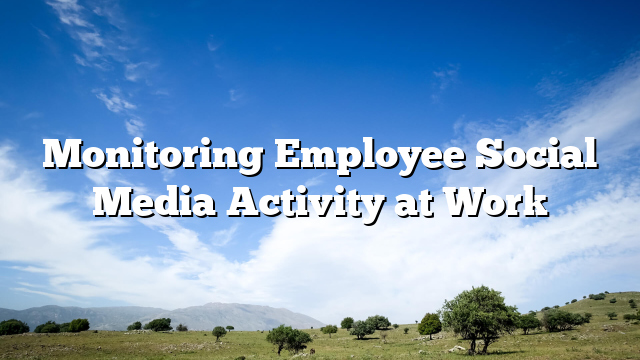Social media outlets like Facebook, Twitter, LinkedIn, etc. are still new enough that there are no general standards on how the courts and legislators should view them with regards to workplace and workforce privacy regulations.
It can be easily assumed that your employees are accessing one or more of their social media accounts at some point during the workday. A recent study by the Pew Research Center revealed 34 percent of employees surveyed use social media while at work to refresh their mental state.
The Pro’s and Con’s of using social media at work
Your employees do not always use social media for personal reasons, they also use it to engage customers, networking with colleagues, increasing website and blog traffic, and building brand awareness. And your employees can be free faces of brands on their own social sites as well as on company official channels and blogs, if they’re clear on the company massaging and what constitutes professional online habits.
But there are potential threats, too. Organization or brand can be held liable for actions their employees take within the course and scope of their employment. If your employee posts inaccurate statements or rumors about a competitor or co-worker on social media, you might be exposed to potential defamation claims.
You might also like to read: Social Media Play An Important Role In Education – Secrets Revealed!
Launch a private social media platform for your employees
In the era of social distancing and remote working, conducting employee engagement activities is tough. And this is where regular social media comes to the rescue, but with privacy concerns. So you need a platform that is secured and private for your organizations only. CircleCare is the ultimate corporate wellness app that also serves as a private social networking app for your organization. CircleCare not only promotes employee engagement but also helps organizations strengthen their culture and operate with higher productivity.
Establish Official Social Media Policies
Currently, there are no federal laws against monitoring employees on social networking sites. You can install employee activity monitoring software on company devices that do this. But to maintain mutual trust among your employees, you should develop a set of social media policies that clearly define acceptable uses of social media at work and whether your company will monitor them or not.
You might also like to read: The Pros and Cons of Social Media on Productivity
What should be in your social media usage policies:
Be detailed about dos and can’t do’s. You can limit what your employees can share online but be specific and make sure it’s relevant to your business. The National Labor Relations Board (NLRB) has criticized overly protective social media policies that prevent employees from exercising their collective bargaining rights, for example, talking about their wages or working environment. On the other hand, employee dissatisfaction is not protected if they are not made in relation to group activity among other employees.
Protect trade secrets. Educate employees about the harm that can be done if they reveal proprietary information, or leak a piece of new product information before it’s ready, or tip-off marketing strategies in their posts, even if the intention is not ill-minded. Remind them that once something is shared, it is difficult if not impossible to completely erase it on social media or web.
Comply with government laws. Employee online behavior must not violate government privacy laws, or be discriminatory, or defamatory. Keep up with evolving laws and regulations aimed at social media activity in the workplace.
Educate and enforce. Communicate with your employees about how your social media policy helps to protect the company and employees from potentially damaging situations. Make sure they fully understand the policies and what the consequences are for violating the rules.

Darren Trumbler is a versatile content writer specializing in B2B technology, marketing strategies, and wellness. With a knack for breaking down complex topics into engaging, easy-to-understand narratives, Darren helps businesses communicate effectively with their audiences.
Over the years, Darren has crafted high-impact content for diverse industries, from tech startups to established enterprises, focusing on thought leadership articles, blog posts, and marketing collateral that drive results. Beyond his professional expertise, he is passionate about wellness and enjoys writing about strategies for achieving balance in work and life.
When he’s not creating compelling content, Darren can be found exploring the latest tech innovations, reading up on marketing trends, or advocating for a healthier lifestyle.
